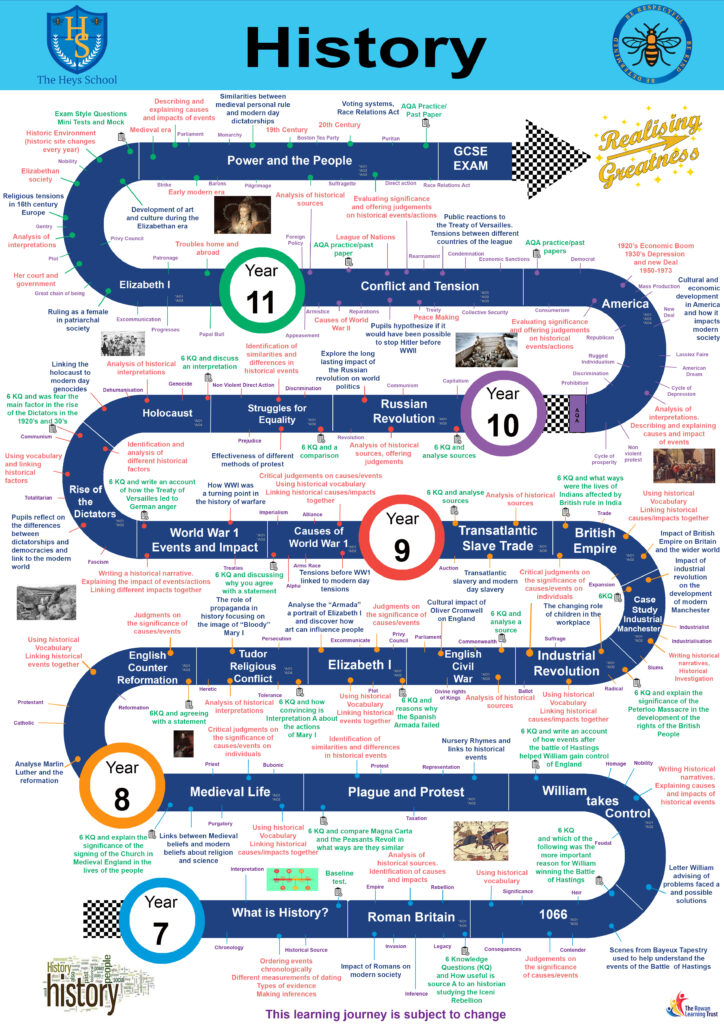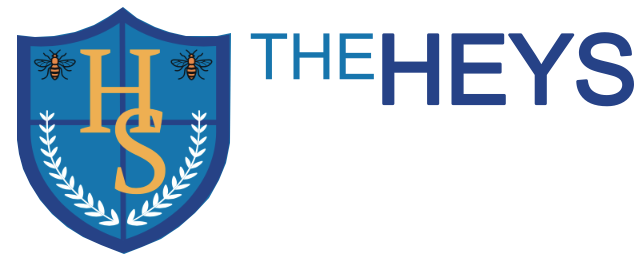
The History Department focuses on developing in students an understanding and a passion for the events, people, and ideas of the past. We aim to engage and excite students about the key properties of the past that have influenced the way we live and think today. We deem that the study of history is paramount to understanding current world politics, economic trends, technological advances, moral choices, and environmental issues that we face today. Through this understanding of the past, our students will be better equipped to shape their choices for the future.
We aim to create the very best historians. We challenge students to think, act and speak like those experts in the field would: to research thoroughly, to weigh-up evidence, to understand chronology, to evaluate interpretations and develop arguments. We do this by a consistent approach across the department ensuring all students develop the range of skills needed to become confident in their own opinions, make well supported judgements and expressing them articulately using keywords from topics and academic, historical vocabulary.
Our curriculum at The Heys School goes far beyond what is taught in lessons, for whilst we want students to achieve the very best examination results possible, we believe our curriculum goes beyond what is examinable. As a department we believe that the transferable skills gained in our subject are essential for life in the 21st century. We teach students the importance of challenging the provenance of information, evaluating different interpretations, and processing large amounts of information to create a coherent argument. We teach empathy and tolerance and an understanding of how history has created the world we live in today.
Collaboration is encouraged as discussion and debate is at the heart of every lesson in History. As a knowledge-engaged curriculum we believe that knowledge underpins and enables the application of skills; both are entwined. As a department we define the powerful knowledge our students need and help them recall it through staff who know the content thoroughly and having a carefully planned curriculum which builds on previous knowledge and helps students understand topics in a wider context.
In Key stage 3 assessments are completed at the end of every topic to track and monitor the progress of students. Feedback is provided to students in terms of the skills they are working towards or have mastered. Targets for further improvement are then shared with students.
At KS3, students are taught in mixed ability classes. They receive a diet of two one-hour periods per week in Years 7 and 9 and a single one-hour period per week in Year 8.
At Key Stage 4 History is a subject that is taught as a GCSE option. Students that opt to take History in Key Stage 4, have 3 hours a week and will work towards a GCSE qualification. They follow the AQA GCSE history programme and will complete two ends of Year11 examinations on the following topics:
Paper 1:
America, 1920–1973: Opportunity and inequality
Conflict and tension: The inter-war years, 1918–1939
Paper 2:
Britain: Power and the people: c1170 to the present day
Elizabethan England, c1568–1603
They will be awarded a grade 1-9 following their GCSE examinations in the summer of Year 11. Assessments to track progress are set regularly throughout each half term. Feedback is related to GCSE criteria to highlight areas of strength and development throughout the course.
Throughout their time at The Heys, students are taught the following key skills:
- AO1: demonstrate knowledge and understanding of the key features and characteristics of the period studied.
- AO2: explain and analyse historical events and periods studied using second-order historical concepts.
- AO3: analyse, evaluate, and use sources (contemporary to the period) to make substantiated judgements, in the context of historical events studied.
AO4: analyse, evaluate, and make substantiated judgements about interpretations (including how and why interpretations may differ) in the context of historical events studied.
|
The topics students cover throughout Key Stage 3 and Key Stage 4 are outlined in the link below: Curriculum Overview History KS3and KS4Links to GCSE Exam Board Specifications https://filestore.aqa.org.uk/resources/history/specifications/AQA-8145-SP-2016.PDF
Long Term KS3 and 4 Scheme of Work KS3
Year 7 Themes/Focus Manchester through the ages Roman Britain 1066 William Takes Control Plague and Protest Medieval Life
Year 8 Themes/Focus English Reformation Elizabeth I Industrial Revolution British Empire
Year 9 Themes/Focus Transatlantic Slave Trade Causes World War 1 World War 1-Events and impact Rise of the Dictators Holocaust Struggles for Equality
KS4
Year 10 Themes/Focus
America, 1920–1973: Opportunity and inequality America 1920’s: Economic Boom America 1930’s: Depression and New Deal America 1950-1973
Conflict and tension: The inter-war years, 1918–1939 Peace making 1918-1921 League of Nations 1920-1936 Causes of World War II 1922-1939 Year 11 Themes/Focus Elizabethan England, c1568–1603 Elizabeth I; Her Court and Government Elizabeth I: Troubles home and abroad Elizabeth I: Elizabethan Society Historic Environment
Britain: Power and the people: c1170 to the present day The Middle Ages: Challenging authority and Feudalism The Early Modern World: Challenging royal authority The nineteenth century: Reform and reformers The twentieth century: Equality and rights |
Year 11 Open house intervention and exam preparation on Monday lunch times
Department produced Revision Guides and Personal Learning Checklist (PLC’s) are used throughout all topic subsections.

